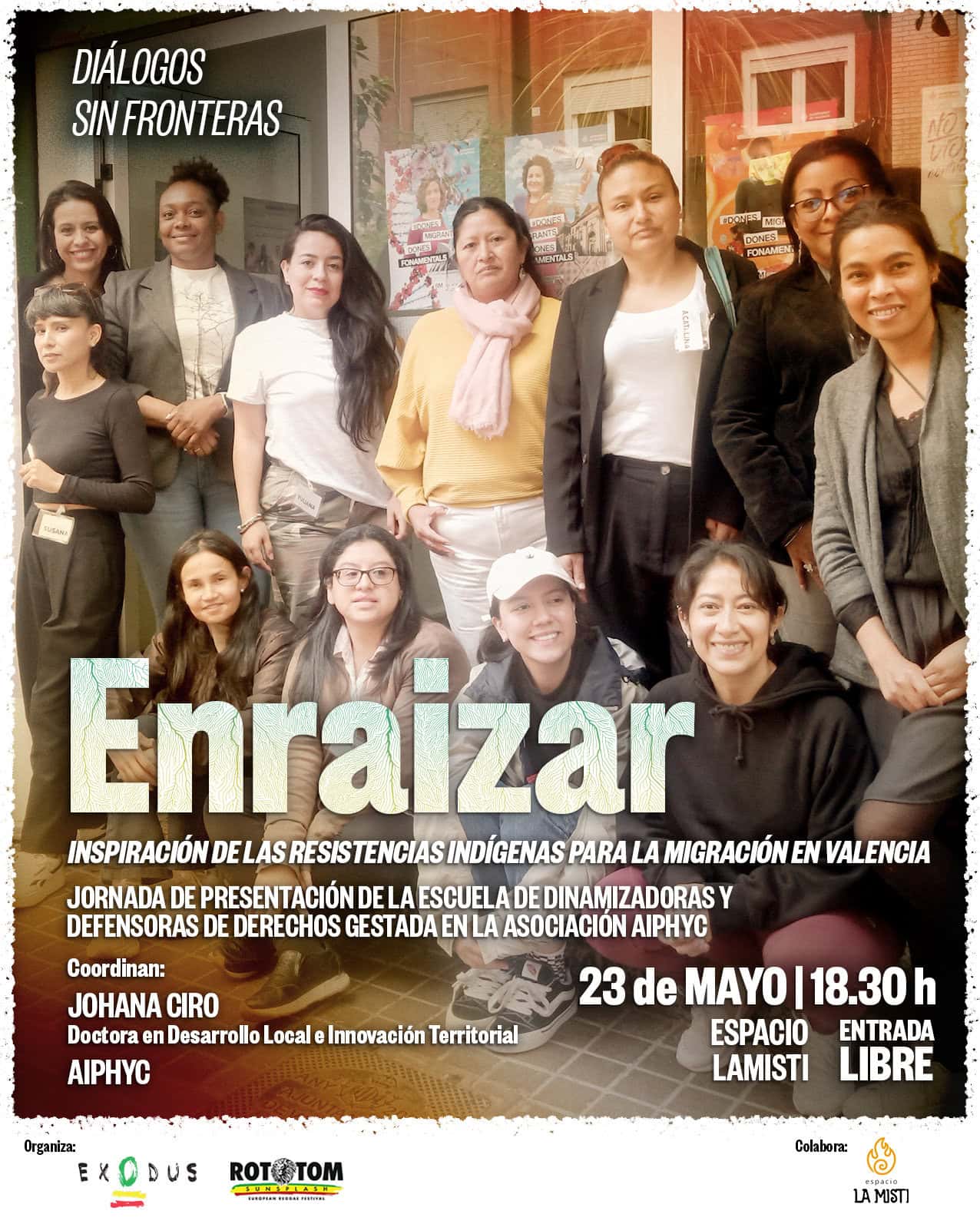Several participants of the AIPHYC Association ‘s School of Advocates and Defenders of Rights, which works to empower and dignify the situation of professional migrant women in the home and care, will share their experience during the day.
How can we strengthen ties between migrant women in Valencia, taking as inspiration the resistance and resilience of native peoples? Under this question will start the world café, and the subsequent session, on which revolves the seventh appointment with the traveling series ‘Dialogues without borders’, promoted by the Exodus Cultural Association and the Rototom Sunsplash festival.
After a scenic tour of such disparate spaces as the Estadio de la Cerámica of Villarreal CF or a vintage fishing boat in the framework of Escala a Castelló, ‘Dialogues without borders’ returns to Valencia. Specifically to the socio-cultural center La Misti, in the neighborhood of Orriols. She did so to present the School of Advocates and Defenders of Rights developed by the School of Advocates and Defenders of Rights developed by (AIPHYC), which aims to professionalize workers in these two sectors, most of whom are employed by migrant women from southern countries.
To highlight the value of indigenous culture, “closely linked to resistance and resilience, but so often minimized, as an element of impulse and regeneration in a world in constant crisis, and as that necessary baggage to face the challenge of interculturality, full and creative, of the migrant population, is the leitmotiv of the session,” Exodus explains.
Under the title ‘Enraizar. Inspiration of indigenous resistances for migration in Valencia’, it will take place on Thursday, May 23rd, 2024, at 6.30 pm. As in all the conferences of the cycle, access is free, although due to the dynamics of the same, the capacity is limited and prior registration is required at the following link link.
The conference, guided by the PhD in Local Development and Territorial Innovation, Johana Cirowill join, to share their experience, several of the migrant women who have been trained “making a titanic effort” -she says- at the AIPHYC School of Activists and Defenders of Rights, a collective that brings together 80 members. “They are women who come from processes of precariousness and disempowerment, many in an irregular situation, with 14- and 16-hour workdays, who find it very difficult to weave networks and who lose their identity when they arrive in this territory,” she explains.
Reversing this trend is the objective of AIPHYC, with seven years of experience, which in its work to recover and protect the cultural identity of these women and to generate support networks through the same cultural identity that unites them, went a step further and created this school. A pilot project that for five months -since last January- has trained them to be dynamic and defenders of rights, working in depth on what Ciro calls “differential empowerment”, which encompasses four autonomies: physical, decision-making, economic and cultural.
Four empowerment processes from these four dimensions on which Ciro developed his doctoral thesis in the Nasa indigenous cabildo of Cali (Colombia), and which he details as follows: “Many of these migrant women are at physical risk, suffer abuse and racism; they have no support networks because their long days as interns make them live very isolated; many lack documentation, do not reach the minimum wage and some are not registered with social security; and to this is added that to fit in here, they lose their identity, they want to change their appearance, and if we stop being us, we end up getting lost in this place.”
The transformation after her time at the School “is of great impact, because when you benefit a woman, the impact is exponential for her, her family and her support network,” says the doctor in Local Development and Territorial Innovation, who recalls that the training and support process has been carried out from Florida Universitaria, where she is principal investigator within the Social Innovation and Inclusive Business Group, which includes a line of research specializing in women at risk of social exclusion.
“From not having the tools and feeling that they were passive listeners, they have gone from being passive listeners to becoming active facilitators; to being firm defenders of their rights and leading projects that help their fellow women who come; to valuing their identity and origin, they feel that their origin, our origin, is valuable and that is our contribution to the host society,” says Ciro. “Our root will make us not feel so strong the envites.”
Johana Ciro summarizes that the aim of this new event in the ‘Dialogues without Borders’ series is to show “how indigenous communities inspire us migrants here in Spain. To vindicate that the greatest contribution to this society is its origins”.
Enraizar’ projects this challenge: “To embody the role of the roots to fight for this interculturality, to build a more humane, fairer and more tolerant society”, they conclude from Exodus.

